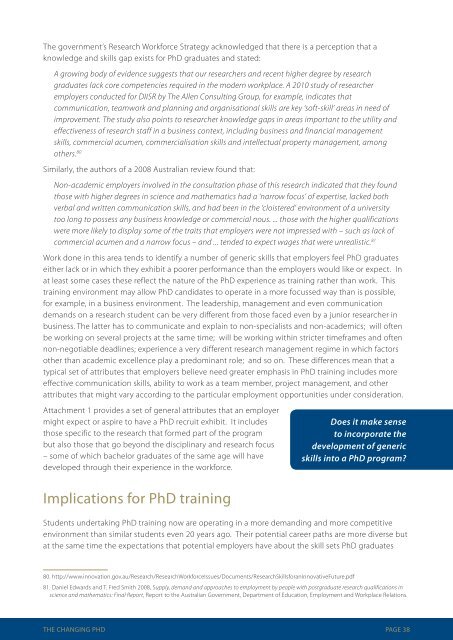the-changing-phd_final
the-changing-phd_final
the-changing-phd_final
You also want an ePaper? Increase the reach of your titles
YUMPU automatically turns print PDFs into web optimized ePapers that Google loves.
The government’s Research Workforce Strategy acknowledged that <strong>the</strong>re is a perception that a<br />
knowledge and skills gap exists for PhD graduates and stated:<br />
A growing body of evidence suggests that our researchers and recent higher degree by research<br />
graduates lack core competencies required in <strong>the</strong> modern workplace. A 2010 study of researcher<br />
employers conducted for DIISR by The Allen Consulting Group, for example, indicates that<br />
communication, teamwork and planning and organisational skills are key ‘soft-skill’ areas in need of<br />
improvement. The study also points to researcher knowledge gaps in areas important to <strong>the</strong> utility and<br />
effectiveness of research staff in a business context, including business and financial management<br />
skills, commercial acumen, commercialisation skills and intellectual property management, among<br />
o<strong>the</strong>rs. 80<br />
Similarly, <strong>the</strong> authors of a 2008 Australian review found that:<br />
Non-academic employers involved in <strong>the</strong> consultation phase of this research indicated that <strong>the</strong>y found<br />
those with higher degrees in science and ma<strong>the</strong>matics had a ‘narrow focus’ of expertise, lacked both<br />
verbal and written communication skills, and had been in <strong>the</strong> ‘cloistered’ environment of a university<br />
too long to possess any business knowledge or commercial nous. ... those with <strong>the</strong> higher qualifications<br />
were more likely to display some of <strong>the</strong> traits that employers were not impressed with – such as lack of<br />
commercial acumen and a narrow focus – and ... tended to expect wages that were unrealistic. 81<br />
Work done in this area tends to identify a number of generic skills that employers feel PhD graduates<br />
ei<strong>the</strong>r lack or in which <strong>the</strong>y exhibit a poorer performance than <strong>the</strong> employers would like or expect. In<br />
at least some cases <strong>the</strong>se reflect <strong>the</strong> nature of <strong>the</strong> PhD experience as training ra<strong>the</strong>r than work. This<br />
training environment may allow PhD candidates to operate in a more focussed way than is possible,<br />
for example, in a business environment. The leadership, management and even communication<br />
demands on a research student can be very different from those faced even by a junior researcher in<br />
business. The latter has to communicate and explain to non-specialists and non-academics; will often<br />
be working on several projects at <strong>the</strong> same time; will be working within stricter timeframes and often<br />
non-negotiable deadlines; experience a very different research management regime in which factors<br />
o<strong>the</strong>r than academic excellence play a predominant role; and so on. These differences mean that a<br />
typical set of attributes that employers believe need greater emphasis in PhD training includes more<br />
effective communication skills, ability to work as a team member, project management, and o<strong>the</strong>r<br />
attributes that might vary according to <strong>the</strong> particular employment opportunities under consideration.<br />
Attachment 1 provides a set of general attributes that an employer<br />
might expect or aspire to have a PhD recruit exhibit. It includes<br />
those specific to <strong>the</strong> research that formed part of <strong>the</strong> program<br />
but also those that go beyond <strong>the</strong> disciplinary and research focus<br />
– some of which bachelor graduates of <strong>the</strong> same age will have<br />
developed through <strong>the</strong>ir experience in <strong>the</strong> workforce.<br />
Does it make sense<br />
to incorporate <strong>the</strong><br />
development of generic<br />
skills into a PhD program?<br />
Implications for PhD training<br />
Students undertaking PhD training now are operating in a more demanding and more competitive<br />
environment than similar students even 20 years ago. Their potential career paths are more diverse but<br />
at <strong>the</strong> same time <strong>the</strong> expectations that potential employers have about <strong>the</strong> skill sets PhD graduates<br />
80. http://www.innovation.gov.au/Research/ResearchWorkforceIssues/Documents/ResearchSkillsforanInnovativeFuture.pdf<br />
81. Daniel Edwards and T. Fred Smith 2008, Supply, demand and approaches to employment by people with postgraduate research qualifications in<br />
science and ma<strong>the</strong>matics: Final Report, Report to <strong>the</strong> Australian Government, Department of Education, Employment and Workplace Relations.<br />
THE CHANGING PHD PAGE 38


